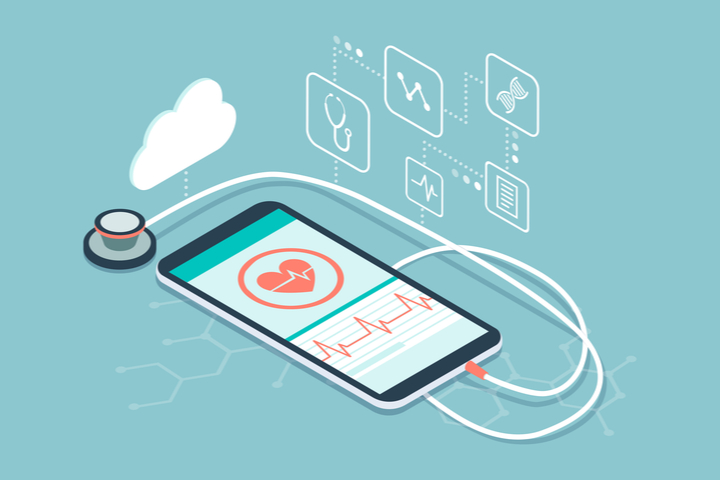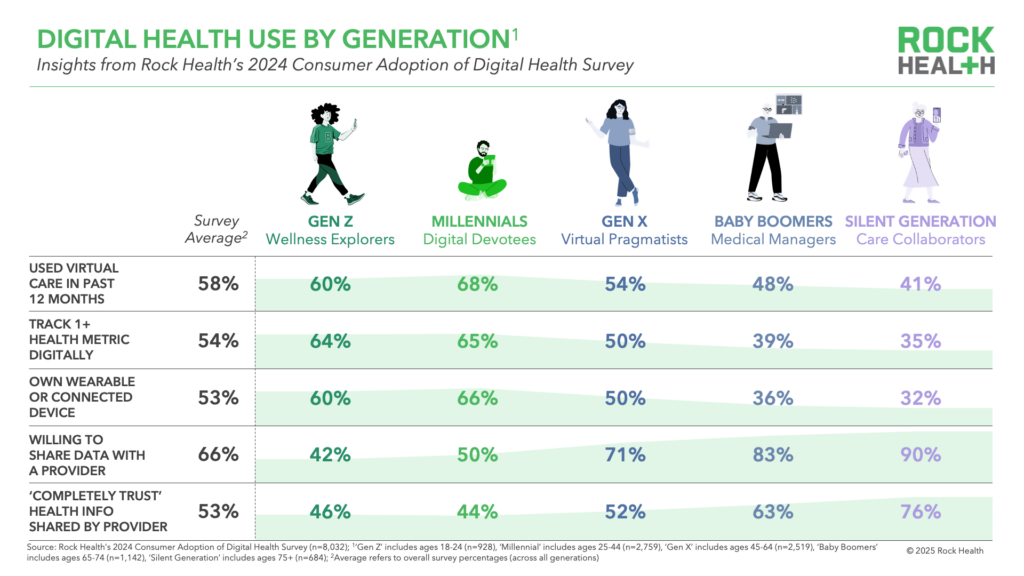 We are now in a post-COVID world, one where telehealth has become more common: approximately 70% of patients in the United State used telehealth services at least once in 2023, up from 15% in 2019. It’s also one where consumers are taking more control of their own healthcare, with 53% owning at least one wearable, and 54% tracking at least one health metric digitally, whether that’s their blood pressure, physical fitness, or weight.
We are now in a post-COVID world, one where telehealth has become more common: approximately 70% of patients in the United State used telehealth services at least once in 2023, up from 15% in 2019. It’s also one where consumers are taking more control of their own healthcare, with 53% owning at least one wearable, and 54% tracking at least one health metric digitally, whether that’s their blood pressure, physical fitness, or weight.
There’s a generational split, though, when it comes to digital healthcare and how each cohort interacts with, as well as how much they trust the healthcare system in general. Younger generations are more likely to embrace and use these technologies, while older people are more trusting of their doctors and their data, according to Rock Health’s 10th Consumer Adoption of Digital Health Survey, which capturing insights from over 8,000 U.S. Census-matched adults in 2024.
Interestingly, it wasn’t Gen Z who were most likely to have used virtual care in the last 12 months but actually Millennials, with 68% having done so, compared to 60% of Gen Zers who said the same, along with 54% of Gen Xers. Meanwhile, less than half of Baby Boomers and the Silent Generation had used these services.
In fact, that 68% of Millennials was ten percentage points higher than the survey average.
“Millennials came into their own during the great startup revolution. They’ve seen industries like finance and retail disrupted by digital businesses, and many digital brands were designed with them in mind (Casper and Warby Parker, anyone?)—so we’re not surprised they’re digital health power users,” wrote Rock Health.
This generation also “represent what most people think of when they imagine the standard digital health consumer,” the report says, as 49% connect with their providers via phone calls, while 45% do so through apps, websites, text, and 44% via live video. They use virtual care most often for primary care, with 29%, while 25% use it for mental healthcare, and 24% for general wellness.
Millennials also are the most likely generation to own a wearable or connected device, 66% compared to 60% of Gen Z, 50% of Gen X, 39% of Boomers, and just 35% of Silents. Not surprisingly, they’re also the ones most likely to track at least one health metric a day, with 65% doing so, while 64% of Gen Zers do so.
Of the 60% of Gen Zers who used virtual care in the past 12 months, one-third accessed it via texting, the highest of any generation; 11% accessed virtual for mental healthcare via texting, app, or website-based messaging, the same percentage as those who got this care over the phone or live video. They are also the top generation using AI for health questions, with 29% using AI tools like ChatGPT for healthcare needs, with 18% “diagnosing” their conditions and 11% using it to explore treatment options.
At the same time, while the use of technology goes down at the generations go up, the opposite is true when it comes to trusting their providers: 90% of Silents say they are willing to share data with a provider, and 83% of Boomers and 71% of Gen Xers say the same, but that number drops quickly to just 50% of Millennials and 42% of Gen Zers.
The same thing goes for completely trusting health info shared by providers: 76% of Silents say yes, as do 63% of Boomers, and 52% of Gen Xers. For Millennials that falls to 44% percent, slightly higher than the 46% of Gen Zers.
“The youngest generation, Gen Zers grew up amidst major healthcare shake-ups, and they’re wary of traditional healthcare players. Nearly 10% distrust health information from providers (a whopping 9x higher rate than the Silent Generation). They’re the least willing generation to share health data, especially with providers and insurers; 17% don’t want to share their health data with any stakeholder,” wrote Rock Health.
“Even with hesitancy toward legacy healthcare, Gen Z sees wellness as a big priority. They’re growing up in the age of TikTok wellness (#FitTok) and celebrity-launched wellness trends, so it makes sense that they’re using digital and consumer-centric solutions to understand their health,” said Rock Health.  (Image source: researchdive.com)
(Image source: researchdive.com)















